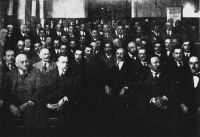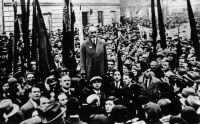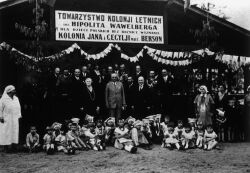





Congress of Jewish Tradesmen, Warsaw 1922. Numerous public and economic institutions, covering almost every aspect of life, played an extremelly important role in lives of the Jewish population in the Second Republic.
Abraham Ozjasz Thon (1870-1936), rabbi, doctor of philosophy, member of the Seym, one of the leaders of the Zionist movement. Zionists aimed at the revival of a Jewish state in Palestine through a mass immigration of the Jews from diaspora.
Leaders of Agudas Yisroel in the presidium of the Congress of Rabbis, Warsaw1932. This orthodox political party gathered so called "pragmatists", who believed, that the "Jewish issue" cannot be settled entirely and once for all, so they focused on protecting the Jews from the effects of worsening economic and cultural conditions of their lives.
|

Labour Day manifestation at the seat of Bund. One of its leaders, Henryk Erlich (1882-1941, murdered in the Soviet Union by NKWD), is giving his speech. Socialists of Bund perceived the chances for the settlement of the Jewish issue in radical change of Poland's regime towards socialism.
Prominent activists of Poale Zion Left. It was a socialist fraction of the Zionist Organization.
The board of the Jewish commune in Skierniewice. Its legal status, structure and activities were determined by ordinances of the President of the Republic of 1927 and 1928. According to them the communes could engage in custodial and charity activities, establish foundations and supervise religious education.
|

President of the Republic of Poland, Ignacy Mościcki, visiting the summer camp for Polish and Jewish children in the Kampinos Forest, 1930.
Except for the assimilated ones, the Jews lived in communes isolated from the rest of the society. Within them there operated mutual aid associations, sports clubs and charities. There were developed education and culture, funded partially by the communes. There functioned various political parties as well: from liberal-conservative to socialist. However it is the Zionists, aiming at a revival of the Jewish state in Palestine, who were most popular. During parliamentary election of 1930 Zionists received 65% of all the votes given for the Jewish parties, whereas Bund got only 10 %.
Central Association of Jewish Craftsmen in Poland during the celebrations of Sea Day, Warsaw 1933. |

